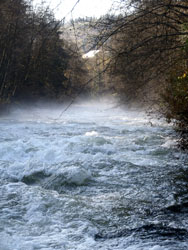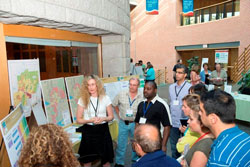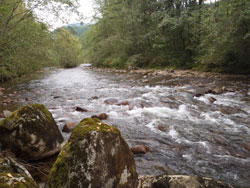
Freshwater Sustainability is one of the Real Estate Foundation’s grant program focus areas. Some of our grants help communities collect information and create plans so they can manage the fresh water more sustainably. Since 2012, we have awarded two grants to the City of Coquitlam to help with the planning process they are undertaking in collaboration with local stakeholders.
 Formed in 2011, following a four-year community engagement process, the Coquitlam River Watershed Roundtable coordinates and implements activities that promote the health and long-term sustainability of the Coquitlam River watershed. The aim was to develop an organization that would reduce conflict and facilitate decision making in the watershed.
Formed in 2011, following a four-year community engagement process, the Coquitlam River Watershed Roundtable coordinates and implements activities that promote the health and long-term sustainability of the Coquitlam River watershed. The aim was to develop an organization that would reduce conflict and facilitate decision making in the watershed.
The Roundtable is supported by a Coordinator and guided by a Core Committee. Members work on a volunteer basis or their participation is supported by their organization. Federal, municipal, provincial, regional and First Nation governments are each represented, as well as sectors covering utilities, development, gravel industry, outdoor recreation, education, arts and culture, and stewardship.
 The organization began with small projects that included public Roundtable meetings, education-based watershed cafés, public outreach events, and promotion through a website and various social media communications.
The organization began with small projects that included public Roundtable meetings, education-based watershed cafés, public outreach events, and promotion through a website and various social media communications.
Early in 2012, the Roundtable voiced the importance of coordinating monitoring efforts and participating in the preparation of a watershed plan. The focus was on working toward consensus on issues that affect the watershed.
With support and input provided by the Core Committee, the City of Coquitlam initiated a monitoring project to help build a current database of water quality data for the Coquitlam River. Now two years since the monitoring began, the data gathered from dam to river mouth provides a snapshot of the overall health of the river system.
Bolstered by grant funding received by the Real Estate Foundation of BC and Metro Vancouver, in summer 2012 the Roundtable launched phase one of the Lower Coquitlam River Watershed Plan. The Roundtable is following the Open Standards for Practice of Conservation, an adaptive management approach that uses an ecosystem services approach to account for both ecological and human well-being goals.
 As of early 2014, the project is on track to complete conceptual models for the factors that rank “high” on impacting watershed health; stormwater, invasive species, development and recreation all put pressure on the watershed. The models will help the Roundtable determine how they can intervene to alleviate the pressures – for example, using political, social, economic or livelihood mechanisms – and develop strategies or action plans the watershed community can help implement over future years.
As of early 2014, the project is on track to complete conceptual models for the factors that rank “high” on impacting watershed health; stormwater, invasive species, development and recreation all put pressure on the watershed. The models will help the Roundtable determine how they can intervene to alleviate the pressures – for example, using political, social, economic or livelihood mechanisms – and develop strategies or action plans the watershed community can help implement over future years.
————————————————————————————-
Margaret Birch is a registered professional biologist with over 30 years’ experience in the environmental and fisheries field. Since 2007, she has been Environmental Services Coordinator at the City of Coquitlam, where she has been instrumental in bringing together diverse interests in the watershed to create the Coquitlam River Watershed Roundtable and undertake planning for the lower reaches of the watershed. She is a member of the Roundtable’s Core Committee.
SHARE